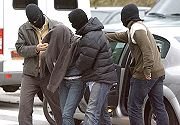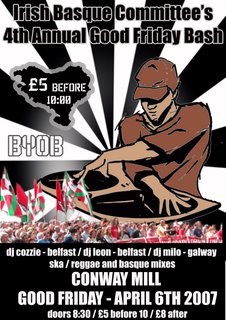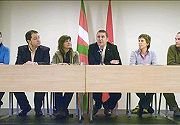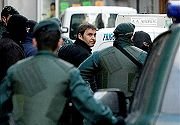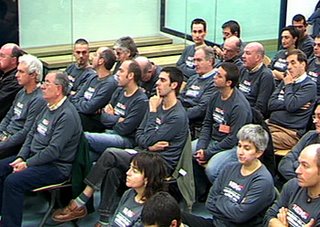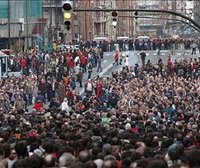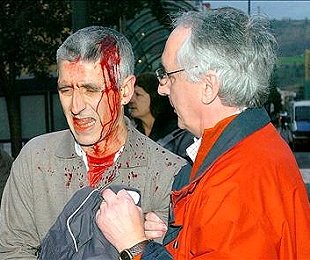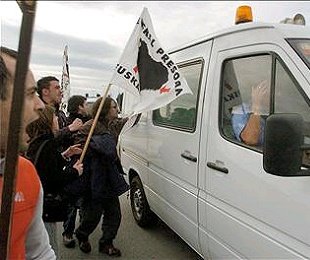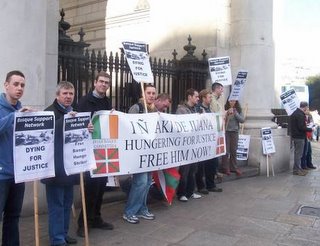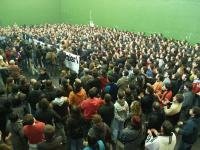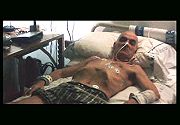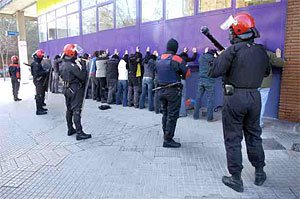Towards Independence and Socialism.
EUSKAL HERRIA-BASQUE COUNTRY. STEP BY STEP ASKAPENA's Informative Service, N. 161 The Spanish government had been carefully preparing a process to eradicate ETA: secret meetings, bilateral agreements, the non-fulfilment of the points previously agreed, non-stop repression of the negotiators in order to subdue them, trying to make the citizens believe that process is on the right path. The aim of this strategy was clearly to make impossible any answer from ETA and even to get that the solution of the process should be for the pro-independence faction at a high political cost.
In the same way, the Spanish government had already designed a campaign of social agitation which should be activated as soon as ETA would announce its intention of continuing with armed activity.
The government's initial calculations went wrong: ETA did not announce in advance its plan of attacking Barajas, against all odds. The government from Madrid which 24 hours before had declared that the peace process was in good shape found itself in a very weak and difficult situation. A weakness used from the very beginning by the right wing in order to attack the government, a government overwhelmed by the critical situation. The PSOE needed some sort of way out in order to accuse the Basque pro independence left wing of the attack against Barajas, trying at the same time to get the citizens backing to its policy during the nine months of cease of fire by ETA.
The fact that there were two victims, two dead immigrants as a result of the attack, was an excellent opportunity for the government to make the environment tense and to attract the immigrants towards the social net against the Basque armed organization.
The demonstration in Madrid What had happened supposed a critical situation for the Spanish right as well. For nine months without any victims the Spanish right wing had asked the Spanish government once and again to stop any contacts with ETA. As soon as the attack on Barajas happened and two victims occur, the PSOE started the campaign that had previously designed.
Which one was the Spanish right wing's positioning? The PP's initial reaction consisted in attacking the PSOE, going from political confrontation to physical confrontation. In fact, some leaders of the Spanish PSOE party that were taking part in a demonstration in front of the Town Hall in Madrid had to escape and take refuge, since extreme right wing activists attacked them.
The second strategy by the PP consisted in avoiding by any ways that the PSOE should be the centre of attention in the demonstration organised by the trade unions close to the government and the Federation of Ecuadorian immigrants. In order to achieve this, the PP asked that the slogan of the demonstration should include ideas and concepts close to the ultra right wing. The UGT trade union -an organization within PSOE's structure- opposed itself fiercely to this approach, since it did not want to give the Spanish right any chance of becoming the centre of attention. In the end after a huge pressure UGT accepted the slogans proposed by the right wing.
But even if so, the Spanish right wing did not join the demonstration, furthermore, it asked that the demonstration should be called off. This attitude has been hardly criticised even by organizations close to the PP. This is the reason why, soon after it announced another exhibition of street ultra exhibition on the 3rd of March.
The demonstrations in Euskal Herria The demonstration in Iruñea: Fissures and links.
The PP's attitude by rejecting participation left, an appendix of the PP within Nafarroa, in an uncomfortable situation; what could Unión del Pueblo Navarro do? UPN did not want to back PSOE, but it did not want either not to take part in a demonstration that presumably was going to be pretty successful. Unión del Pueblo Navarro made clear to PP that they were not very happy about the whole matter and in the end there were a few representatives of the Spanish right wing, the very few needed to figure.
The traditional Basque right wing had no problems in participating in the event along with the party they do often unconditionally support: the PSOE. Thanks to this support PSOE's repressive policy was undoubtedly strengthened. There were some other individuals along with the Ecuadorians, but there were anyway divisions.
Their representatives asked that "ETA's terrorism" should not be underlined. Even if so, during the gathering, some ultra-right movements appeared with banners making reference to "ETA's terrorism".
The demonstration in Bilbo: Thirst for confrontation When the process was blocked, the president of the South-West Basque Country, Ibarretxe had made some sort of comments about the need of mobilising the citizens in order to reactivate the process. This idea was not compatible with the strategy designed by the PSOE, a strategy that until that moment had been closely followed by the Basque right wing, this is: "do not do anything and let the situation get blocked, since everything is under control".
After the attack against Barajas, the situation did change. Following the strategy from Madrid they had to mobilise society but, which slogan use for that aim? The PNV had no doubt about it: they would accuse ETA. The President of the PNV, being no so dependant on the PSOE, considered that they had to reassure the validity of peace and dialogue. Ibarretxe, the Basque Government President and the PNV chairman on the 5th of January discussed on the proposal and on the slogan for the demonstration.
The Basque Government President on that same day in the afternoon announced a demonstration under the maxim: "Peace and Dialogue" for the 13th of January. This proposal was badly accepted in his own party and much worse in the PSE. Even if so, on the 7th of January, the president of the pro Spain socialist party's maxim representative confirmed their presence in the demonstration.
But soon after, a new subject appeared. The Basque pro independence left wing, for months had been asking for peace and dialogue; it felt itself part of the society summoned for the demonstration, it had also made clear that they were prepared to lose all the prominence if doing so the peace process would get reinforced. But what would happen if the Basque left wing decided to go to the demonstration? The alarms went off!
The PSE in a not very democratic tone, made very clear that if Batasuna was also going, they would stay at home. The PNV, affected by some sort of hysterical and collective crisis, increased its demands so that "the bad boys and girls" should not go to Bilbo. The sectors close to Ibarretxe recommended keeping the slogan, but this strategy failed when Batasuna announced its participation. Ibarretxe, the Basque Government President, being under a huge pressure by the political parties and especially by its own party, decided to change the slogan "so that the violent ones could not go to a demonstration in favour of peace".
The PP rejected all the time any possibilities of going to Bilbo, the Basque pro independence left wing decided not to go since they had adulterated the initial project. The PSOE achieved to impose its scheme. In the PNV the party structure, very inclined towards any pacts with Madrid, was imposed. The most nationalist sector within the PNV that agreed with the initial slogan of the demonstration was defeated. The Basque bourgeoisie has once again bet on collaborationism supporting the Spanish governments' aggressive strategy.
Euskal Herria, January 2007. www.askapena.orginfo@askapena.org


